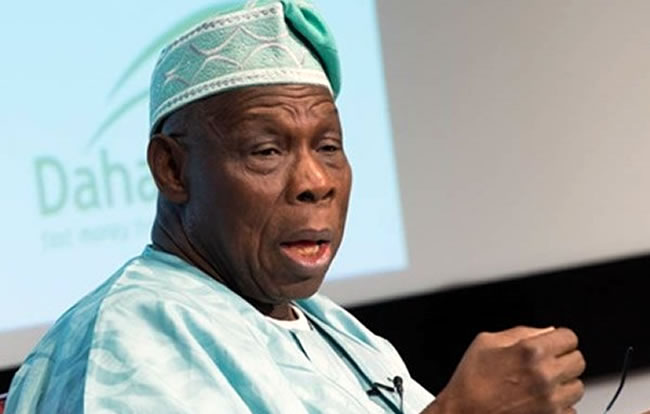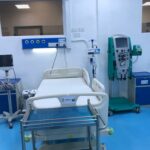Former President Chief Olusegun Obasanjo; Speaker of the House of Representatives, Hon. Femi Gbajabiamila and stakeholders drawn from the academia and civil society organization on Tuesday expressed grave concerns over the fate of 20 million out-of-school children acoss the country.
Speaking during the panel discussion at the one-day National Summit on Tertiary Education Reform with the theme: ‘Reimagining Tertiary Education in Nigeria: Issues, Challenges and Solutions’, organized by the office of the Speaker, the former President underscored the need to prioritize education.
He said: “The greatest resources we have in this country are the people. How many are we today? We are about 216 million and that is a great resource. Tertiary education is very important. But education, particularly education that has left 20 million of our children out of school and those 20 million have no access to education.
“They cannot be effectively part of nation building because they have not had the opportunity to develop their innate capacity to the extent that they can be useful to themselves, to their families and to their community let alone their nation, let alone Africa.
“Now tertiary education is important and my emphasis is on education properly, because the five points I have taken from your speech are zeroed on education in general, although we have the issue of ASUU and the government. And that would be an unending. In my time we had it. And if any government had done anything for ASUU my government did. They all started buying cars and building houses. Even primary school teachers were buying cars. But we must find a solution.
“So, what are the issues? The issues to me are that we are cutting more than we can chew. Who is looking at our population ahead of time, five years from now and 10 years from now, and what can we do about it? And apart from food which is very important, who are the people thinking about that and working forward on that. After food and after health, the next important aspect of our life is education.
“Now, if this is the position and these are rights that we must have, what do we do? We know that if we continue the way we are going, by the year 2030, 2040, 2050 what our population would be. We have to think about it and how we would sort it.
“And I believe, that you ask where did we miss the road? We missed the road when the whole world is talking of free education. Education for all. And we did not follow that. It was bad news. We today we have 20 million out of school children. Almost 10 percent of the population. We continue to miss and we are still missing. That is a very bad one. Can we do anything about it? I believe we can. Those 20 million children that are out of school, we can get them back to school.
“If we do not get them back to school, we are preparing for Boko Haram of tomorrow. It will happen as sure as daylight. What can we do? Where are these 20 million children? Where are they located? Can we have schools in the morning and afternoon to get them in at least for six years. In the period of six years where this is happening, we would prepare for the transition from primary school to secondary school. And if we are able to do that, we have started the process of lifting education, an instrument of nation building.
“I believe anybody who is able to go through Secondary School has the basic to prepare himself as a working person. And that is possible, and that must be the minimum. And I believe that Nigeria has the resources to able to get all the children of Nigeria through secondary education. All the children, no exception, male and female,” Chief Obasanjo noted.
In his remarks, Hon. Femi Gbajabiamila underscored the need to provide the required resources to modernise and improve educational infrastructure and provide the right training for Nigerian youths from primary through tertiary education.
“Allow me this morning to speak the truth as I see it so that together we can agree on what we need to do to overcome. Time was when the tertiary institutions in our country were centres of excellence, comparable to the best institutions elsewhere in the world. There was a time when our brothers and sisters from across Africa and even farther away sought out our institutions, and we welcomed them in droves. That time is no more.
“It used to be that a student admitted to the university knew the date of their graduation and graduated on that day. And it once was that a career in academia guaranteed stable employment and an honourable quality of life. For the most part, all of these now exist as memories of a distant past. But it really wasn’t so long ago. I do not speak of these things to mourn the past or dwell in the memory of what was.
“I speak from a place of hope that by reminding ourselves of what was, we might be inspired to embrace the possibility of all that could be if we make the right choices now.
“For eight months this year, students of federal tertiary institutions sat at home due to a litany of unresolved issues between the Academic Staff Union of Universities (ASUU) and the Federal Government of Nigeria. These university strikes are almost perennial and preceded this government. The recent one was not the first and may not be the last unless we determine to make it so.
“The end of the strike was a relief to all; it meant the resumption of academic activities and a return to routine for students. However, the end of the strike did not mean all the issues of funding, education standard, and student and staff welfare had been resolved.
“At the time, I called for the government, universities, unions, and citizens to see the moment as an opportunity to begin the critical conversation about the future of public tertiary education in the country,” the Speaker stressed.
On his part, Minister of State for Education, Goodluck Opia, who affirmed that increasing population was affecting the funding of education, however noted that Nigerian Universities have misused their autonomy.
He said: “Tertiary Education Trust Fund TEFUND had released over N2.3 trillion to the various institutions to create more infrastructure, support research and improve documentation but with the increasing population there was no much impact.”
According to him, there are 2,015 Universities, 4 Inter-University Centres, 219 Polytechnics/Monotechnics, 115 Colleges of Education, 147 Innovation/Enterprise Institutions in Nigeria.
Out of all these, there are 49 federal universities, 40 federal Polytechnics, 27 Colleges of Education, 19 Monotechnics, 25 Vocational Enterprise Institutions, 7 Innovation Institutions under the purview of Federal Ministry of Education.
ALSO READ FROM NIGERIAN TRIBUNE
- TUESDAY FLAT OUT: Between The Content Of Our Character And The Colour Of Our Currency
- EDITORIAL: Toxic Suya






